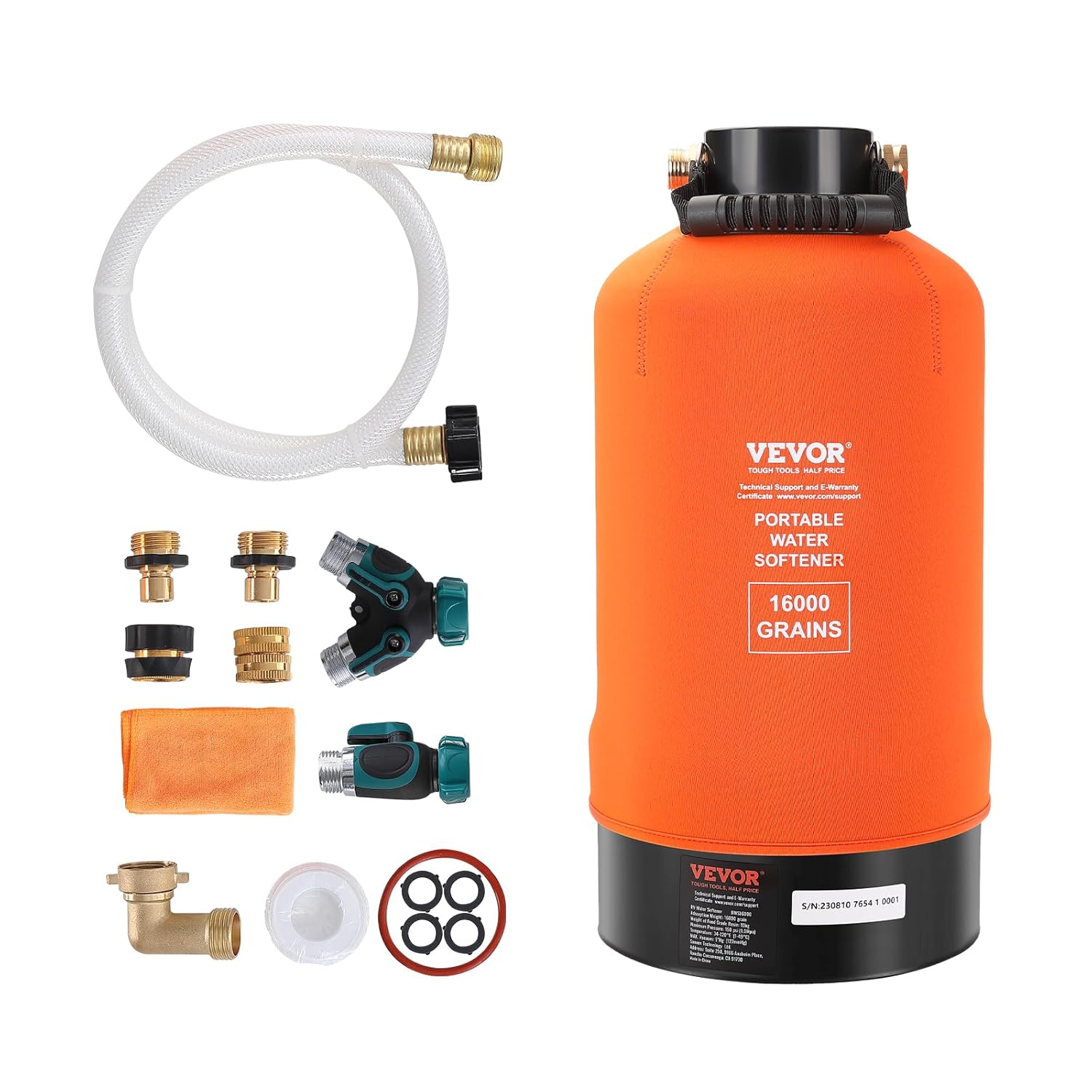?Want a portable water softener that actually makes hard water usable on the road or at home?
Product Overview: VEVOR RV Water Softener, 16,000 Grain Portable Water Softener, with 3/4″ Brass Fittings and 42″ Hose, Soften Hard Water Filter System for RVs, Trailers, Boats, Mobile Car Washing, Pressure Washing
You’re looking at a compact, no-electricity-required softener designed for portable use. This unit aims to drop water hardness to 0–3 gpg, handle up to 16,000 grains of capacity, and attach easily to RVs, hoses, or pressure washers with 3/4″ brass fittings.
What this product promises you
It promises improved water taste and odor, reduced mineral buildup on fixtures and appliances, softer skin and hair after showers, and easier soap lathering. The design emphasizes portability, quick setup, and long-lasting resin life so you don’t need to replace filters often.
Key Specifications
This section lays out the most important specs so you can quickly see how the softener matches your needs. The table below summarizes capacity, materials, fitting sizes, and performance claims.
| Feature | Specification |
|---|---|
| Model | VEVOR RV Water Softener (Portable, 16,000 Grain) |
| Softening Capacity | 16,000 grains (up to 2,461 gallons regenerated at <6.5 gpg)< />d> |
| Resin Type | Recyclable food-grade resin |
| Recommended Salt for Regeneration | 52 oz (1,472 g) per regeneration |
| Expected Resin Life | ~5 years (with typical use) |
| Flow Connections | 3/4″ inlet/outlet (brass fittings) |
| Included Hose | 42″ hose |
| Max Pressure | 150 psi |
| Shell/Tank | Glass fiber shell; NFS polyethylene tank |
| Electricity | Not required |
| Portability | Ergonomic handle, portable size |
| Typical Softness Result | 0–3 gpg after treatment |
Why these specs matter to you
Knowing how many grains the unit can handle, the fittings provided, and the regeneration needs helps you plan for maintenance, matching your campsite or water source, and whether this unit will keep up with your usage.
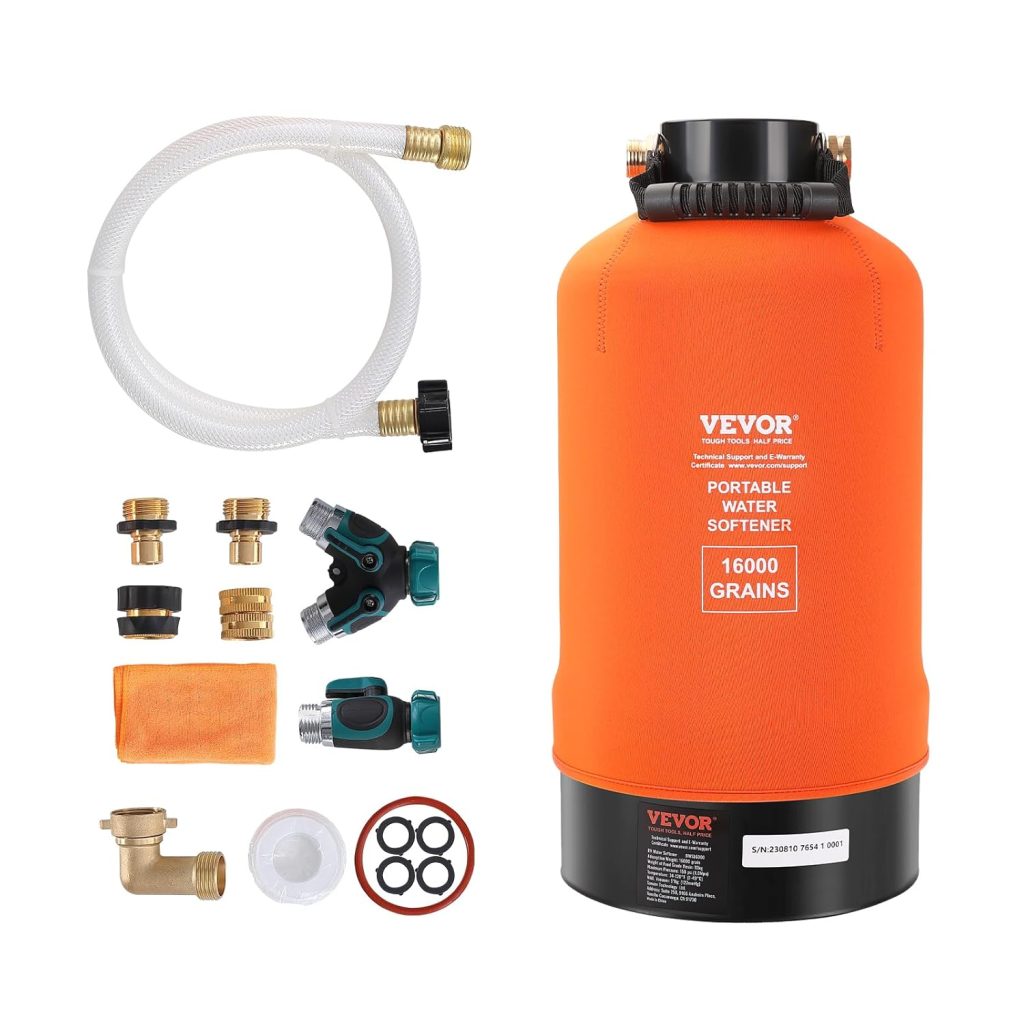
Performance and Real-World Use
You want to know whether it actually reduces hardness and how it affects everyday tasks. This section covers softening performance, flow, pressure, and how it affects showers, dishwashing, and appliance longevity.
Water Softening Effectiveness
In practical terms, the unit uses 16,000 grains of capacity to remove calcium and magnesium ions that cause hardness. If your source water measures under 6.5 gpg, one regeneration yields about 2,461 gallons of soft water — that’s roughly 30–50 days of typical RV use depending on how much water you use.
You should notice less scale on faucets and shower heads, better soap and shampoo performance, and a reduction in spots when washing dishes or the RV exterior.
Flow Rate and Pressure Handling
The 3/4″ fittings and large flow design help maintain a healthy flow for showers and rinsing. Because the softener supports up to 150 psi, you aren’t likely to see pressure drops in most RV and household scenarios.
You’ll appreciate this when using pressure washers or filling tanks — the unit is built not to choke water flow while still treating the water effectively.
Taste, Odor, and Skin Benefits
After softening, water often tastes smoother and can smell fresher, because some metallic tastes from dissolved minerals are reduced. For your skin and hair, softened water allows soaps to lather more easily and rinse out more cleanly, which often results in softer skin and shinier hair.
If you’ve suffered from dry skin when using hard water, you’ll likely notice a tangible improvement.
Installation and Setup
You want setup to be painless, and this unit is designed for exactly that. No electrician or plumber required — you install it yourself in minutes.
What’s in the box
You get the softener tank with an ergonomic handle, 3/4″ brass connectors, a 42″ hose, and basic accessory fittings to connect to RV, garden hose, or other hoses.
You’ll have everything necessary to connect to a standard RV city water inlet or a garden hose without needing adapters in most cases.
Step-by-step setup
- Connect the included 42″ hose to the softener’s inlet using the brass fitting.
- Attach the other end of that hose to your water source (garden hose spigot, RV city water connection, or pressure washer inlet).
- Connect the outlet to your RV’s water inlet or the next device in your line using the 3/4″ outlet fitting.
- Open the source water slowly to flush the system, checking for leaks.
- Once connections are leak-free, go ahead and use water normally.
The process should take around five minutes if you already have the water source and connection point ready.
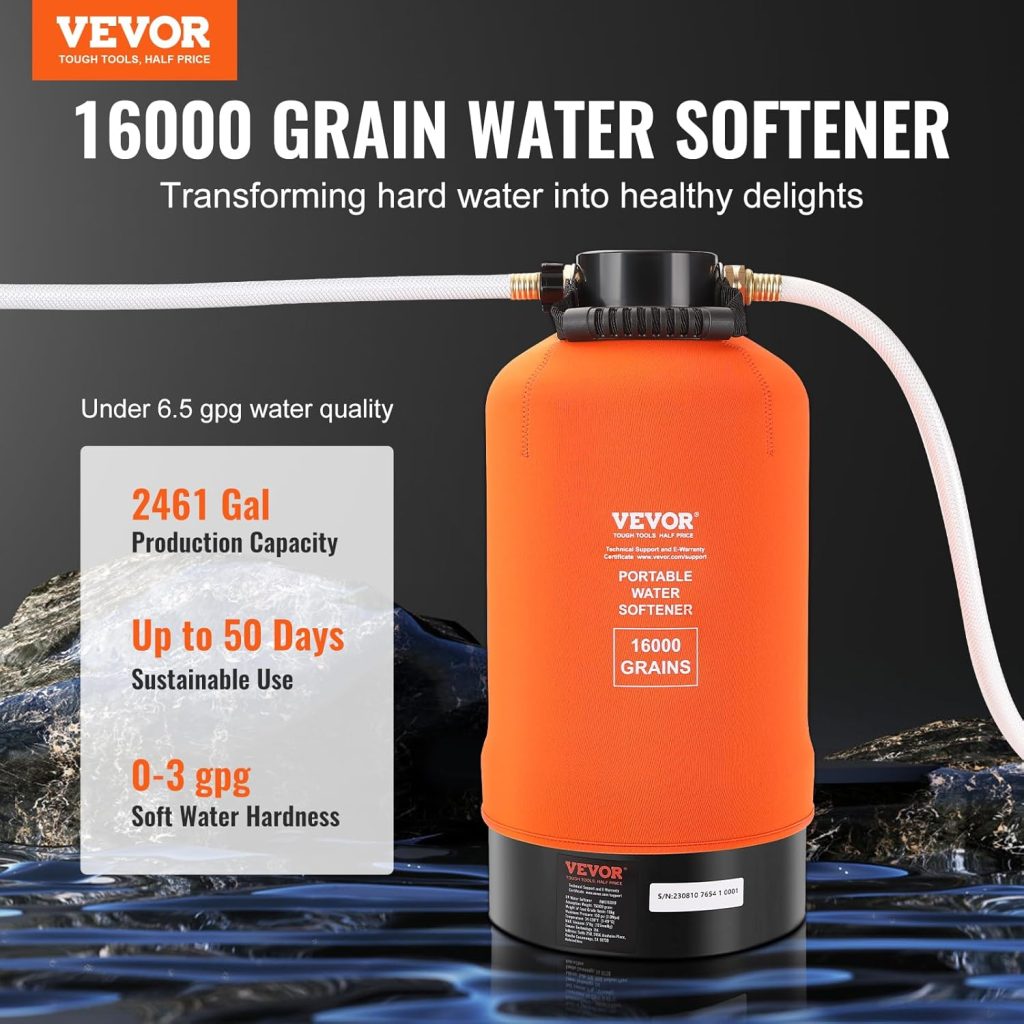
Regeneration and Maintenance
You need predictable maintenance so you can plan salt purchases and schedule regenerations without surprises. This unit uses a simple salt regeneration process.
How regeneration works for you
When softening capacity is spent, you add 52 oz (1,472 g) of salt to regenerate the resin. The resin swaps sodium (from salt) for the trapped hardness ions and refreshes its softening ability.
You’ll perform regeneration every ~50 days under light use with source hardness under 6.5 gpg, or more frequently if your water is harder or your usage is higher.
Frequency and tips
- If your reported hardness is above 6.5 gpg, you’ll regenerate more often. Check local water reports or test your water with a cheap test strip before relying on the 50-day estimate.
- Use high-quality softener salt to keep the resin working smoothly and avoid unnecessary residue.
- Rinse the unit after regeneration as directed to avoid salt carryover into your water supply.
- Store the softener in a cool, dry place when not in use to prolong resin life.
Expected lifespan and replacements
The recyclable food-grade resin is designed to last about five years of regular use. You won’t be changing disposable cartridges every few months — instead, you’ll do periodic regenerations and possibly replace the resin after several years.
Build Quality and Materials
You want durability for travel and varying water conditions. The materials in this unit are chosen for strength and safety.
Food-grade resin and safety
The resin is labeled food-grade, meaning you aren’t getting resins treated with harsh chemicals that could leach into your water. This is reassuring when you use the unit for drinking water, cooking, or washing.
You’ll still want to follow the manufacturer’s regeneration and rinsing instructions to minimize any risk of residual salt presence.
Shell and tank construction
A glass fiber shell and NFS polyethylene tank provide a strong, corrosion-resistant housing that stands up to pressure and rough handling. These materials are common in portable softeners because they balance weight, strength, and durability.
You’ll be able to toss it in your RV locker or store it on a boat without worrying that it’ll crack under typical conditions.
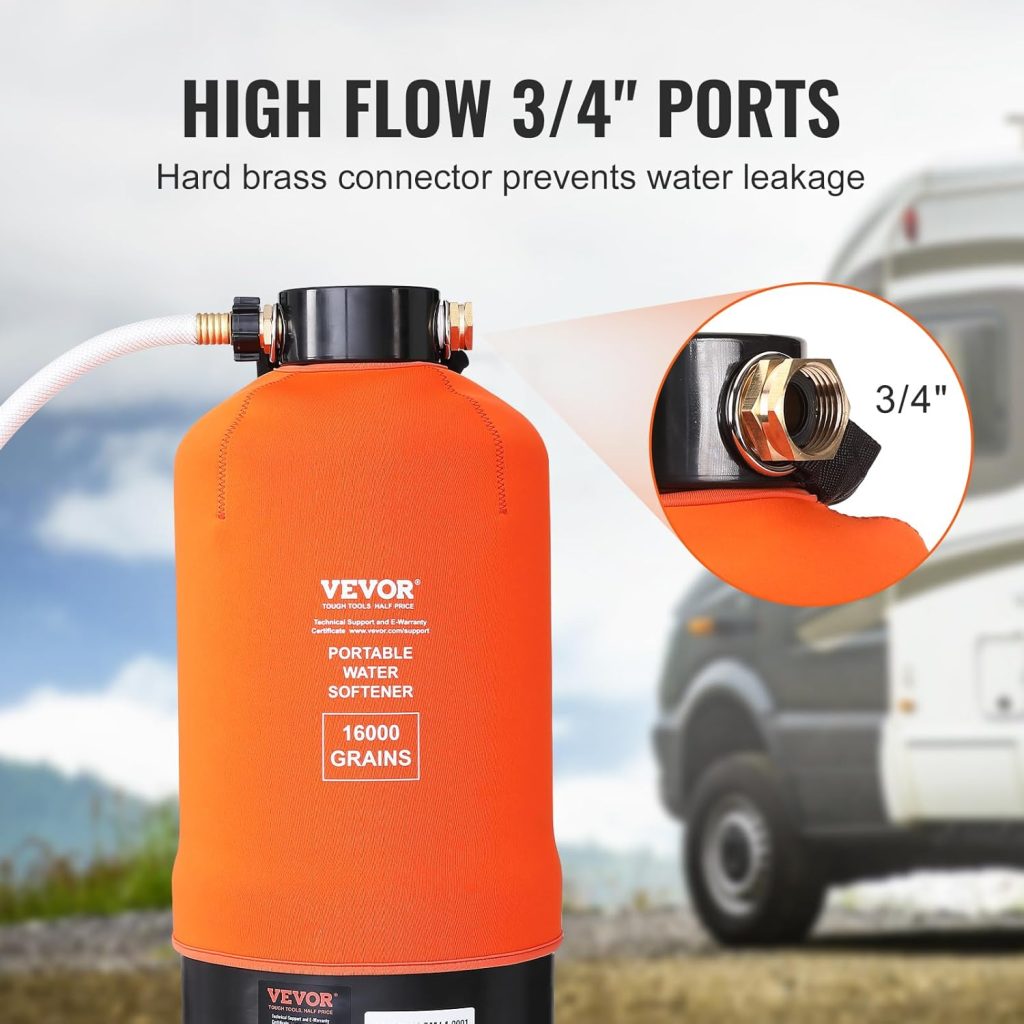
Pros and Cons
You’ll weigh benefits against limitations, so here’s a clear list to help you decide.
Pros
- Portable and easy to carry; ergonomic handle.
- No electricity required — works anywhere you have water pressure.
- 16,000-grain capacity treats a lot of water before regeneration.
- 3/4″ brass fittings and 42″ hose for quick hookup.
- High pressure tolerance (up to 150 psi).
- Recyclable, food-grade resin with ~5-year lifespan.
- Cost-effective regeneration using 52 oz of salt.
You’ll appreciate the convenience and long run-time between regenerations, especially on extended trips.
Cons
- Regeneration involves handling salt and planning around capacity.
- If your source water is extremely hard (significantly above 6.5 gpg), you’ll regenerate more frequently.
- It’s not a whole-house permanent softener — it’s intended for portable or point-of-use scenarios.
- The unit adds another item to pack and maintain during trips.
If you need a permanent household system, this unit isn’t a direct replacement. But for mobility and occasional use, it’s a practical option.
Comparison to Alternatives
You want to know how this stacks up versus other options like small cartridge filters, salt-free conditioners, or full-sized home softeners.
Portable salt-based softeners vs. salt-free conditioners
Salt-free conditioners change how minerals behave but don’t actually remove them. The VEVOR softener removes hardness (ion exchange), which typically results in visibly less scale and better soap performance.
If your priority is actual mineral removal for appliances or limescale prevention, you’ll prefer the VEVOR unit. If you want a maintenance-free conditioner and aren’t worried about scale, salt-free might suffice.
Portable vs. fixed home softeners
Full-sized home softeners have larger tanks, automatic regeneration, and higher capacity without manual salt handling for weeks to months. However, they’re not portable and require plumbing and electrical considerations.
If you need a softening solution that follows you between campsites, boat docks, and home, the VEVOR portable softener is the more flexible choice even though you’ll perform manual regenerations.
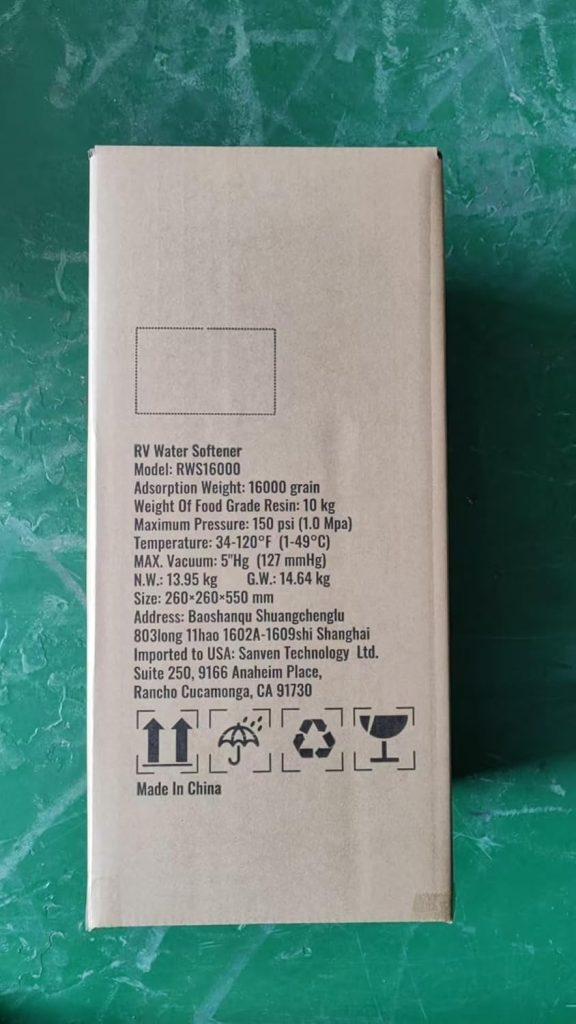
Use Cases: Where this Product Shines
You want specific scenarios so you know whether it fits your lifestyle. Here are common contexts where this softener is particularly useful.
RVs and travel trailers
You’ll find this ideal for RVs because you can connect it to city water hookups at campgrounds to avoid mineral buildup in your plumbing, water heater, and appliances while on the road.
You’ll also appreciate the quick setup when you arrive at a new site.
Boats and marine use
Using it on a boat reduces scale in faucets and on surfaces, and since it doesn’t need power, you avoid drawing down batteries. The corrosion-resistant tank materials are also helpful in marine environments.
Mobile car washing and pressure washing
Because it maintains flow and pressure, you can attach it to pressure washers or hose systems for softer rinses that reduce spotting and improve soap action on vehicles or exteriors.
You’ll get cleaner rinses and less mineral spotting when hand-washing cars or equipment.
Camping and remote water sources
For remote sites with unknown water hardness, the unit gives you control over water quality without needing electric hookups. It can make water more pleasant for drinking, cooking, and bathing.
You’ll carry it in the RV or truck and set it up at the tap you’re using.
Practical Tips for Best Results
You want actionable guidance to make the unit work well for you. These tips will help extend resin life and simplify use.
- Test your source water hardness before relying on the 50-day regeneration estimate. Test strips are inexpensive and give fast results.
- Keep a small supply of softener salt in your RV storage so you can regenerate on the road when needed.
- After adding salt for regeneration, flush the system thoroughly to prevent salty taste on first uses.
- Avoid using table salt; use salt formulated for water softeners to reduce residue and bridging.
- Monitor inlet and outlet fittings for leaks periodically and apply plumber’s tape where needed to ensure a good seal.
- If you’ll store the softener for long periods, rinse and dry the tank and keep it in a dry spot to protect fittings.
These steps make running and storing the softener smooth and predictable.
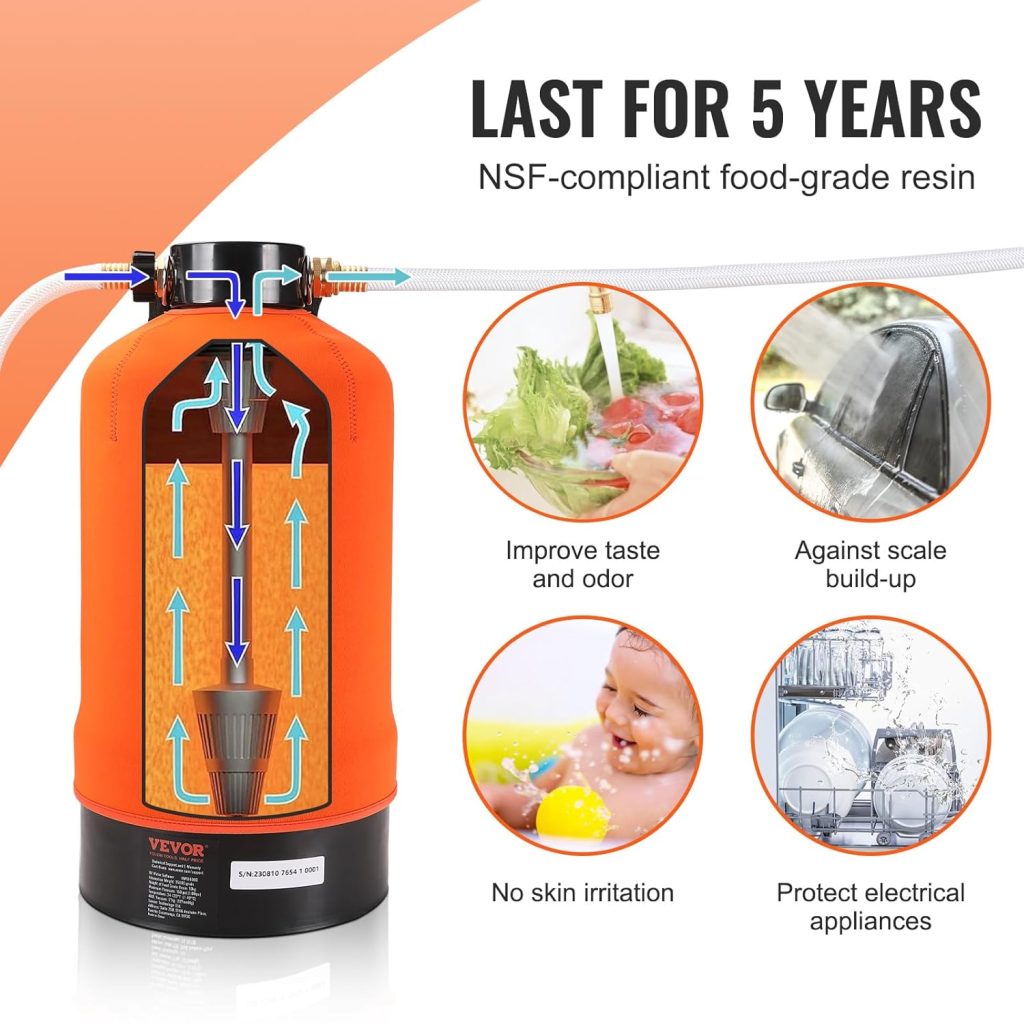
Troubleshooting Guide
You want clear fixes for common problems. Here’s what to check if something isn’t working right.
Low or no softening effect
- Check if you’ve reached the 16,000-grain capacity and need regeneration.
- Confirm correct salt type and proper regeneration procedure was used.
- Test your raw water hardness — very high hardness will shorten the time between regenerations.
Leaks at fittings
- Tighten brass connectors carefully; use plumber’s tape on threads if needed.
- Inspect O-rings and hoses for cracks or wear; replace if damaged.
- Don’t overtighten plastic fittings; use hand-tight plus a small quarter turn if necessary.
Reduced flow or pressure
- Make sure debris hasn’t clogged the inlet screen.
- Confirm water source pressure is within normal ranges and not being limited elsewhere.
- Check for kinking in the hose or downstream restrictions.
Strong salty taste after regeneration
- Run several tankfuls of water through the system after regeneration to clear residual brine.
- Ensure you used the correct amount of salt (52 oz) and followed rinse steps.
Frequently Asked Questions (FAQ)
You likely have specific questions — here are concise answers to common concerns.
Q: Will this unit remove chlorine or other contaminants?
A: This softener specifically removes hardness ions (calcium and magnesium) by ion exchange. It’s not designed to remove chlorine, bacteria, or chemical contaminants. Consider adding a separate carbon or particulate filter if you need broader purification.
Q: Can I drink the softened water?
A: Yes, softened water from ion exchange is generally safe to drink, but it contains increased sodium. If you have sodium-restricted diets, consider using untreated water for drinking or installing a separate drinking water filter.
Q: How often will I need to regenerate?
A: Regeneration frequency depends on your source water hardness and water usage. At hardness less than 6.5 gpg, you can expect about 2,461 gallons per regeneration (~50 days for light RV use). Higher hardness or heavier use shortens that interval.
Q: Is the resin safe and durable?
A: The resin is food-grade and recyclable, designed for roughly five years of sustained use under normal conditions.
Q: Can I use the unit year-round?
A: Yes, but avoid freezing temperatures while it contains water, as freezing can damage the tank and fittings. Drain and store it indoors in cold climates.
Final Verdict
You want a clear recommendation. If you travel, boat, or run mobile cleaning services and need a portable, effective solution to hard water, this VEVOR RV Water Softener is a pragmatic choice. It balances portability, capacity, and performance with straightforward regeneration and rugged construction.
You’ll appreciate the 16,000-grain capacity, 3/4″ brass fittings, and the ease of hookup. If you need a permanent whole-house softening solution, look to larger, installed systems — but for portable, on-demand soft water, this unit delivers strong value.
Buying Tips
Before you purchase, keep these practical points in mind so you get the best satisfaction from the product.
- Measure your typical daily water use and test the hardness of your source water to estimate regeneration frequency.
- Buy softener salt in bulk if you travel frequently to save on cost and avoid last-minute trips to resupply.
- Confirm the fittings and inlet/outlet threads match your existing hoses; adapters are easy but check compatibility.
- Consider a pre-filter if your source water has particulates or sediment to protect the resin from fouling.
- Read warranty and return policies so you’re prepared for any manufacturing issues.
These steps help you set up for months of trouble-free soft water.
Quick Setup Checklist
You’ll find this brief checklist helpful when you’re ready to put the unit into service.
- Test source water hardness.
- Ensure you have the 42″ hose and 3/4″ connectors ready.
- Place the softener near the hookup point and ensure it’s upright.
- Connect inlet and outlet securely using brass fittings.
- Slowly open water and inspect for leaks.
- Use water and check softness; schedule regeneration as needed.
Use this checklist the first few times to get confident with the process.
Closing Notes
This VEVOR RV Water Softener is designed for your mobile life — simple to set up, robust enough for higher pressures, and capable of delivering appreciably softer water for bathing, washing, and general use. You’ll need to perform periodic regenerations and plan salt purchases, but in return you get a powerful portable solution that helps protect your plumbing, improves washing results, and enhances comfort on the road.
If you have specific questions about compatibility with your RV or a particular water pressure system, tell me your current setup and water hardness and I’ll help you determine whether this is the right fit.
Disclosure: As an Amazon Associate, I earn from qualifying purchases.


